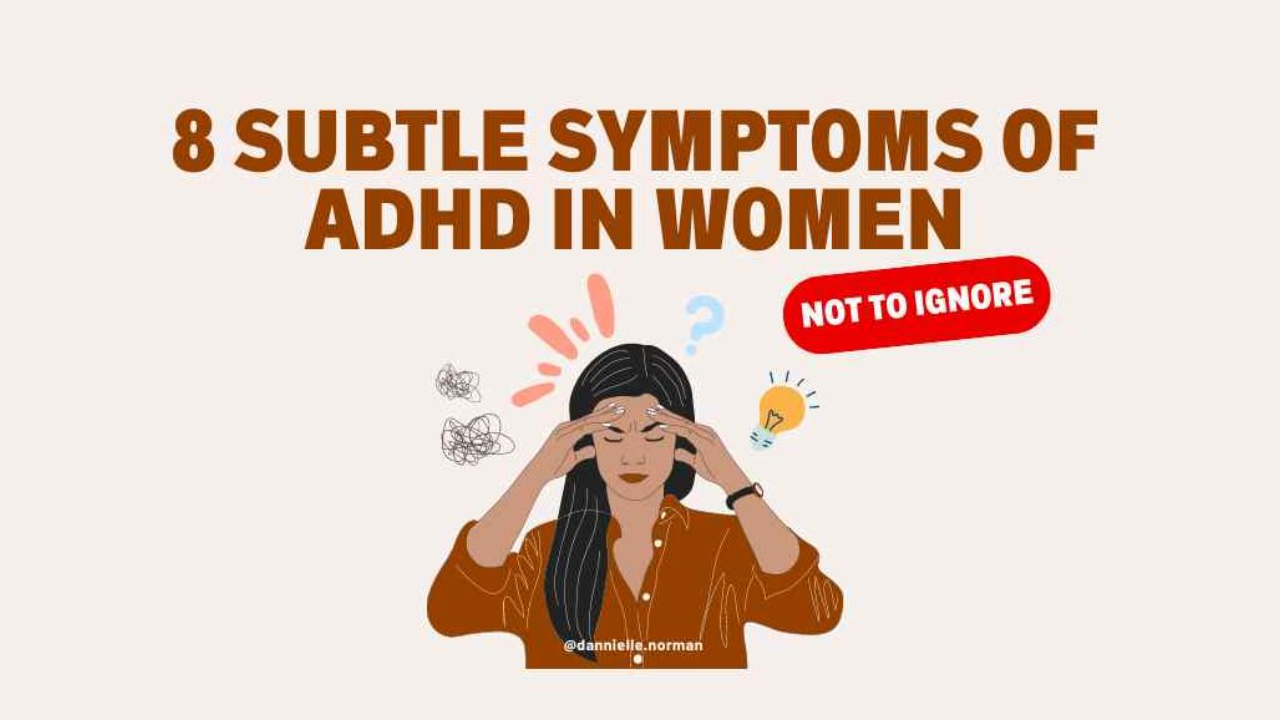ADHD in Women: 8 Subtle Signs NOT to Ignore
Mar 01, 2023
In my experience of living with undiagnosed ADHD, it wasn't obvious I had ADHD. While there were some clues, it wasn't until my late 20's when I began to notice stark differences between myself and my peers that I really thought "huh, something's up..."
While it had been briefly suggested to me one time by a learning support teacher at around 18, it was never mentioned again, and the common (incorrect) belief that ADHD "wore off" with age meant I never took it seriously. I didn't understand ADHD and massively underestimated its impact.
When you live with ADHD, it frames your whole world. You're used to it. So spotting the signs isn't always as easy. Others know you too, and a lot of this can get written off as "that's just who you are". This subtlety and dismissal of what could potentially be ADHD is damaging and can have a major impact on quality of life, mental health, and someone's future.
Thankfully, recognising the symptoms of ADHD in women is beginning to change, but it's still hard. This is especially true when the signs are not always obvious or straightforward bouncing off the walls. It's great there's ongoing growth in awareness, but this still tends to be limited to mental health spaces and not so mainstream.
As someone who was diagnosed with ADHD in my late 20s, it's my passion to help others identify the less common signs of ADHD and understand how it impacts their daily lives.
Today we're focusing on some of the more private and "subtle" signs of ADHD. Please remember these are part of a "layering" of symptoms and not individually indicative of ADHD:
-
Excessive daydreaming: Women with ADHD may often get lost in their thoughts and find it hard to stay focused on the task at hand. This can lead to difficulty with completing tasks, and sometimes even forgetfulness.
-
Hyperfocus: While ADHD is often associated with distractibility, some women with the disorder experience intense focus and may become absorbed in a task for hours on end. This can be a positive trait, but it can also lead to neglecting other important responsibilities.
-
Sensitivity: Women with ADHD may be more sensitive to their environment, such as loud noises, bright lights, or certain textures. This can be overwhelming and lead to difficulties with sensory processing.
-
Emotional Dysregulation: Women with ADHD may experience intense emotions, such as anger, frustration, or sadness more frequently and intensely than their peers without ADHD. This can lead to impulsive behavior or difficulty managing relationships.
-
Social difficulties: Women with ADHD may find it challenging to make and maintain friendships due to their difficulty with executive functioning and self-regulation. They may also struggle with interpersonal relationships or have difficulty reading social cues.
-
Procrastination and Difficulty with self-motivation: Women with ADHD may have difficulty initiating and following through with tasks that they find uninteresting, especially if they don't have any external motivation.
-
Sensitivity to stimuli: Women with ADHD may be more sensitive to their environment, especially when it comes to sounds, smells, and textures. This can make it difficult for them to focus in busy or crowded environments.
-
Imposter syndrome: Women with ADHD may feel like they are constantly "faking it," as they struggle with the self-doubt and insecurity that often accompanies the disorder. This can lead to procrastination and avoidance of tasks, which can make the symptoms worse.
These less common symptoms of ADHD can have a significant impact on a woman's daily life, including their work, relationships, and overall well-being. It's important to recognize these signs and seek out a professional diagnosis if necessary.
Treatment options for ADHD can include medication, therapy, or a combination of both - alongside lifestyle changes. In my coaching, I believe that therapy is integral to managing ADHD as it helps begin unpacking the woven web of life, feelings and thoughts that people with ADHD often experience.
A holistic approach is important in managing ADHD symptoms, including exercise, a nutritious diet, and mindfulness practices. There are no quick "fixes" to ADHD and it doesn't mean you're broken; it does however require acknowledgment and adaptions in order to improve.
If you suspect that you or someone you know may have ADHD, don't hesitate to seek professional help. Identifying and managing ADHD can improve the overall quality of life and lead to greater success and fulfillment in all areas of life.
Stay gorgeous,
Dannielle
Want more 1:1 support? Check out how we can help you with The Heart Led Coaching and Therapy options.
Want more regular-ish goodness?
Sign up for more ADHD, anxiety & relationship emails plus be the first to hear of offers and more!
We hate SPAM. We will never sell your information, for any reason.

